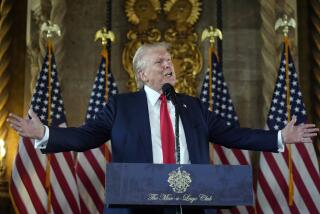Judge Regrets Disclosing Impaneling of Grand Jury
- Share via
WASHINGTON — A federal appeals court judge who is a Democratic appointee apologized Friday for what he said was his inadvertent disclosure that a new grand jury had been impaneled to investigate President Clinton.
The jurist, Richard D. Cudahy of Chicago, said he mentioned the existence of the new panel Thursday when responding to a media inquiry about why he had voted that the investigation of Whitewater independent counsel Robert W. Ray could continue for another year.
Ray, meanwhile, was authorized by Cudahy and two other judges who supervise Ray’s office to break his silence about the matter. Ray said that the grand jury will investigate possible criminal charges against the president in connection with his affair with Monica S. Lewinsky, the former White House intern, but would not take any action before Clinton leaves office next January.
In a statement, Ray said he regrets that Cudahy’s disclosure led to “unsubstantiated accusations” that his own office had engineered a political leak just hours before Vice President Al Gore addressed the Democratic National Convention Thursday night.
He said that the disclosure about the grand jury, which was secretly impaneled on July 11, “undermines our ability to complete this matter in a prompt, responsible and cost-effective manner.” He did not explain his reasoning for this statement.
Referring to repeated accusations of leaks when the counsel’s office was headed by Kenneth W. Starr, his predecessor who resigned last October, Ray said: “This office condemns any unauthorized disclosures, especially those made on occasions that may have an untoward effect on the political process.”
Cudahy’s admission, in a statement from the judge’s office distributed by Ray, forced Democrats into retreat a day after they had accused Ray’s staff as the presumed source of the leak.
Before Cudahy’s acknowledgment, the reaction of Rep. Charles B. Rangel (D-N.Y.) was typical of some Democrats. Rangel said that disclosure of the grand jury’s existence amounted to “another Republican dirty trick” and that, “if Clinton were to drop dead tomorrow, they would dig him up and appoint a grand jury to investigate him.”
Ironically, a year ago Cudahy wanted to shut down Starr’s investigation but was outvoted by the two other Republican appointees on the three-judge panel that oversees independent counsels.
Cudahy wrote at the time that “an endless investigation . . . can serve no possible goal of justice and imposes needless burdens on the taxpayers.”
But this week, he joined his two fellow justices in agreeing to continue Ray’s investigation--a decision that he suggested was influenced by the existence of the grand jury.
Leaks aside, the decision by Ray to impanel the new grand jury got mixed reviews Friday from legal experts, with some suggesting that it means the prosecutor has new evidence to explore and others criticizing him for poor judgment.
“He obviously thinks he has new evidence,” said Lawrence J. Ross, a former longtime federal prosecutor who now practices law in Washington. “Otherwise, why would he impanel new grand jurors five months before the president leaves office?”
Paul Rothstein, a professor of constitutional and criminal law at Georgetown University, interpreted Ray’s action to mean that “there is some substantive possibility he would want to indict.” But Rothstein said setting up a new grand jury five months before Clinton leaves office--and before the November election--seems unnecessarily political because “Mr. Ray could easily have waited until next January or February” to take such action.
In view of Starr’s lengthy investigation by grand jurors who were dismissed months ago, the new panel would not have to call the same witnesses again, Rothstein and others said.
Unless Ray has spotted possible new evidence, his prosecutors simply could read portions of previously obtained testimony to the new grand jurors so they could consider charges such as perjury and obstruction of justice against Clinton. Those two allegations were the basis of his impeachment by the House late last year. The Senate, however, refused to remove him from office.
“It would be wiser for Mr. Ray to drop this case after all the country has been through,” Rothstein said.
Lawrence E. Walsh, the independent counsel who investigated the Iran-Contra scandal during the Reagan administration, said that conjecture about Ray’s agenda is “pure speculation. This doesn’t mean he’s going to indict and it doesn’t mean he’s not.”
Walsh added that “the question Ray has to decide is whether he can get a conviction. To indict and get an acquittal would be a lousy way for him to end things up.”
Presidential scholar Stephen Hess at the Brookings Institution said that a criminal case against Clinton after he leaves office would be “absolutely horrible for the country.” He likened the situation to that of Nixon, who resigned and was pardoned by his successor, Ford, ending any possibility of prosecution for Watergate misdeeds.
With Nixon, “it was not necessary to put the country through all that turmoil and I think exactly the same situation applies here. . . . Clinton’s place in history is already smirched,” Hess said.
He said he doubts that Ray will seek to bring an indictment. Rather, the independent counsel may be using the grand jury “to simply cover all his bases and parts of his anatomy, too,” insulating himself from charges that he had not fully investigated the case.
More to Read
Get the L.A. Times Politics newsletter
Deeply reported insights into legislation, politics and policy from Sacramento, Washington and beyond. In your inbox twice per week.
You may occasionally receive promotional content from the Los Angeles Times.










